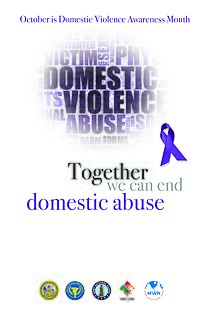Psychological abuse, often called emotional abuse, is a form of abuse characterized by a person subjecting or exposing another person to a behaviour that may result in psychological trauma, including anxiety, chronic depression, or post-traumatic stress disorder. It is often associated with situations of power imbalance in abusive relationships, and may include bullying, gaslighting, and abuse in the workplace. It also may be perpetrated by persons conducting torture, other violence, acute or prolonged human rights abuse, particularly without legal redress such as detention without trial, false accusations, false convictions, and extreme defamation such as where perpetrated by state and media.

Violence against women (VAW), also known as gender-based violence and sexual and gender-based violence (SGBV), are violent acts primarily or exclusively committed against women or girls. Such violence is often considered a form of hate crime, committed against women or girls specifically because they are female, and can take many forms.

The situation of Human Rights in Pakistan is complex as a result of the country's diversity, large population, its status as a developing country and a sovereign Islamic democracy with a mixture of both Islamic and secular law. The Constitution of Pakistan provides for fundamental rights. The Clauses also provide for an independent Supreme Court, separation of executive and judiciary, an independent judiciary, independent Human Rights commission and freedom of movement within the country and abroad. However these clauses are not respected in practice.
Domestic violence occurs across the world, in various cultures, and affects people across society, at all levels of economic status; however, indicators of lower socioeconomic status have been shown to be risk factors for higher levels of domestic violence in several studies. In the United States, according to the Bureau of Justice Statistics in 1995, women reported a six times greater rate of intimate partner violence than men. However, studies have found that men are much less likely to report victimization in these situations.

The relationship between Islam and domestic violence is disputed. Even among Muslims, the uses and interpretations of Sharia, the moral code and religious law of Islam, lack consensus. Variations in interpretation are due to different schools of Islamic jurisprudence, histories and politics of religious institutions, conversions, reforms, and education.
The Constitution of Chad provides for freedom of religion; however, at times, the Government limited this right for certain groups. There are seldom reports of societal abuses or discrimination based on religious belief or practice. The different religious communities generally coexisted without problems, although some tensions between different Muslim groups and between Muslims and Christians were reported.
Domestic violence in Chile is a prevalent problem as of 2004. Domestic violence describes violence by an intimate partner or other family members, regardless of the place the violence occurs.

Sharifa Tahiya Alkhateeb was an American writer, researcher and teacher on cultural communication and community building for Islam and Muslims in the United States. She was involved in feminist causes, domestic violence prevention, as well as interfaith and educational organizations. She founded the first nationwide organization for Muslim women in the US and was the first woman to receive the Community Service Award from the Islamic Society of North America.

Domestic violence is violence or other abuse that occurs in a domestic setting, such as in a marriage or cohabitation. Domestic violence is often used as a synonym for intimate partner violence, which is committed by one of the people in an intimate relationship against the other person, and can take place in either heterosexual or same-sex relationships or between former spouses or partners. In its broadest sense, domestic violence also involves violence against children, parents, or the elderly. It can assume multiple forms, including physical, verbal, emotional, economic, religious, reproductive, or sexual abuse. It can range from subtle, coercive forms to marital rape and other violent physical abuse, such as choking, beating, female genital mutilation, and acid throwing that may result in disfigurement or death, and includes the use of technology to harass, control, monitor, stalk or hack. Domestic murder includes stoning, bride burning, honor killing, and dowry death, which sometimes involves non-cohabitating family members.

Women in Malaysia receive support from the Malaysian government concerning their rights to advance, to make decisions, to health, education and social welfare, and to the removal of legal obstacles. The Malaysian government has ensured these factors through the establishment of Ministry of National Unity and Social Development in 1997. This was followed by the formation of the Women's Affairs Ministry in 2001 to recognise the roles and contributions of Malaysian women.
Domestic violence in Iran is a form of expressed by one partner or partners against another partner or partners in the content of an intimate relationship in Iran.

Domestic violence in United States is a form of violence that occurs within a domestic relationship. Although domestic violence often occurs between partners in the context of an intimate relationship, it may also describe other household violence, such as violence against a child, by a child against a parent or violence between siblings in the same household. It is recognized as an important social problem by governmental and non-governmental agencies, and various Violence Against Women Acts have been passed by the US Congress in an attempt to stem this tide.
The following outline is provided as an overview of and topical guide to domestic violence:
Nahid Angha is a Sufi scholar, author, lecturer and human-rights activist. She is the co-director and co-founder of the International Association of Sufism (IAS), founder of the International Sufi Women Organization, the executive editor of the journal Sufism: An Inquiry, the main representative of the IAS to the United Nations, and the creator of the Building Bridges of Understanding Series. She has written over twenty published books and many articles, and has lectured on Sufism, spirituality, human rights and peace at the United Nations; at the Smithsonian Institution; at Science and Spirituality, Italy; at the Council for a Parliament of the World's Religions (CPWR) conferences in Cape Town, and in Barcelona; UNESCO's culture of peace conference in Mexico, among others. She was among the distinguished Sufi leaders and scholars invited to gather for the first annual Shakir World Encounters in Marrakesh, Morocco in 2004. She is the first Muslim woman inducted to the Marin Women's Hall of Fame, honored at Visionary Marin in 2012 by the Marin Interfaith Council, and the Huffington Post named her as one of the 50 Powerful Women Religious Leaders To Celebrate On International Women's Day, 2014. She has been an active advocate for human rights with a focus on women's rights.
Domestic violence in Pakistan is an endemic social and public health problem. According to a study carried out in 2009 by Human Rights Watch, it is estimated that between 10 and 20 percent of women in Pakistan have suffered some form of abuse. An estimated 5000 women are killed per year from domestic violence, with thousands of others maimed or disabled. Women have reported attacks ranging from physical to psychological and sexual abuse from intimate partners. In 1998, of the 1974 reported murders, the majority of victims were killed by family members. A survey carried out by the Thomson Reuters Foundation ranked Pakistan as the third most dangerous country in the world for women, after Afghanistan and the Democratic Republic of Congo. The majority of victims of violence have no legal recourse. Law enforcement authorities do not view domestic violence as a crime and usually refuse to register any cases brought to them. Given the very few women's shelters in the country, victims have limited ability to escape from violent situations.
Domestic violence is prominent in Nigeria as in many parts of Africa. There is a deep cultural belief in Nigeria that it is socially acceptable to hit a woman to discipline a spouse. Cases of Domestic violence is on the high and shows no signs of reduction in Nigeria, regardless of the age, tribe, religion or even social status. The CLEEN Foundation reports 1 in every 3 respondents admitting to being a victim of domestic violence. The survey also found a nationwide increase in domestic violence in the past 3 years from 21% in 2011 to 30% in 2013. A CLEEN Foundation's 2012 National Crime and Safety Survey demonstrated that 31% of the national sample confessed to being victims of domestic violence.

Domestic violence in same-sex relationships is a pattern of violence or abuse that occurs within same-sex relationships. Domestic violence is an issue that affects people of any sexuality, but there are issues that affect victims of same-sex domestic violence specifically. These issues include homophobia, internalized homophobia, HIV and AIDS stigma, STD risk and other health issues, lack of legal support, and the violence they face being considered less serious than heterosexual domestic violence. Moreover, the issue of domestic violence in same-sex relationships has not been studied as comprehensively as domestic violence in heterosexual relationships. However, there are legal changes being made to help victims of domestic violence in same-sex relationships, as well as organizations that cater specifically to victims of domestic violence in same-sex relationships.
Since the early 1980s, rhetoric on violence against women (VAW) has started to become acceptable in the everyday discourses of Malaysians. Independent women activists in Malaysia first started to come together to organise against VAW. Their objective was to create a violence-free society. Physical and sexual violence against women can occur in various forms such as domestic violence, sexual violence, and emotional violence. In Malaysia, government departments and NGOs such as the Ministry of Women, Family and Community Development and Women's Aid Organisation provides help for women.

Domestic violence in South Korea is the mental, physical, verbal or sexual abuses or crimes of violence committed towards a victim in a domestic setting of marital relations and cohabitation. Domestic violence describes violence towards a domestic partner, towards children and between siblings. According to the Domestic Violence Survey of South Korea in 2010, elder abuse was estimated to be 10%, physical abuse accounted for 2.2%, emotional abuse 9%, economic abuse 1.2%, and neglect 2.5%. Marital violence has been the most prevalent form of family violence in South Korea. One out of six couples in South Korea had more than one episode of physical violence from their spouse.
Zainab Alwani is Founding Director and Associate Professor of Islamic Studies at Howard University School of Divinity.








